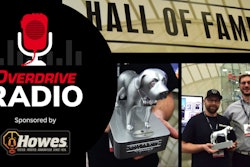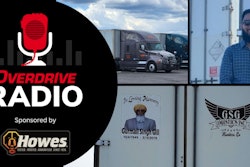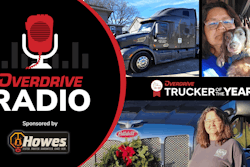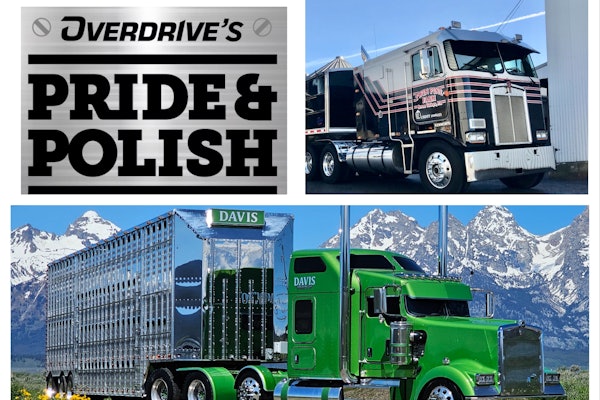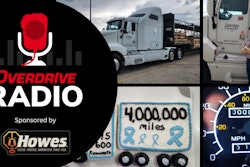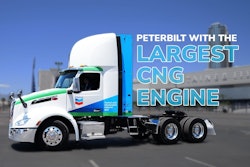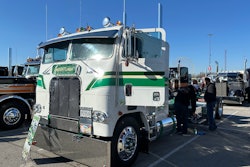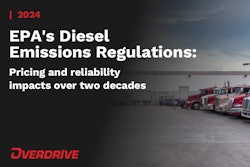Today, Schloo runs dedicated to a particular customer in Long Haul Trucking’s network and can make a regular round in a day’s time, keeping him not far from his two-acre property in Austin throughout his week. Those runs have been his bread and butter now for nearly two decades, pulled since 2014 behind a Peterbilt 386 glider powered by a 12.7 Detroit Series 60 he bought new at the time.
Ever with an eye on ways to save, the owner-operator adjusted his physical damage insurance shortly after the purchase, limiting the radius of his coverage to 500 miles with Great West Casualty, outside the policy he'd previously purchased through LHT. That's just one example among many of moves made and routines built through the years that have delivered long-term stability and profits for Schloo. Current LHT CEO Jason Michels, in my prior story about the owner-operator, told of meeting Schloo early in his own trucking career, when he was just getting started with LHT as an owner-operator himself. Schloo and Michels met in West Virginia getting loaded there for a run back to Minnesota, along which they talked extensively.
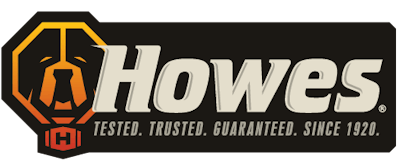 Overdrive Radio's sponsor is Howes, longtime provider of fuel treatments like its Howes Diesel Treat anti-gel and Lifeline rescue treatment to get you through the coldest temps, likewise its all-weather Diesel Defender, among other products.
Overdrive Radio's sponsor is Howes, longtime provider of fuel treatments like its Howes Diesel Treat anti-gel and Lifeline rescue treatment to get you through the coldest temps, likewise its all-weather Diesel Defender, among other products.
A lot of Schloo’s success comes back to insurance, truth be told -- building the business nest egg and other practices to guard against the unexpected. That extends to health and disability. He’s carried a disability insurance policy for decades. It’s proven plenty effective against income disruptions, particularly when 15 years ago now he had a heart attack that threw everything he’d built into question. Take a run through Schloo's story for more in this week's podcast:
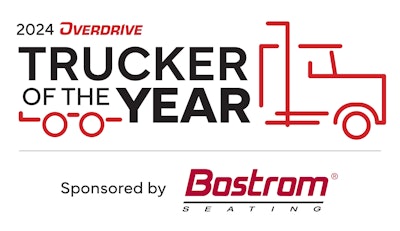 Overdrive's 2024 Trucker of the Year program, sponsored by Commercial Vehicle Group and Bostrom Seating, recognizes clear business acumen and unique or time-honored recipes for success among owner-operators. Through October, we're naming Truckers of the Month to contend for the Trucker of the Year honor. Finalists will be named in December, and a winner crowned early next year. Nominations continue to be sought for exceptional owner-operators, whether leased or independent, throughout the year. Nominate your business or that of a fellow owner (up to three trucks) via this link for a chance to win a custom replica of your tractor and a Bostrom seat from Commercial Vehicle Group, among other perks.
Overdrive's 2024 Trucker of the Year program, sponsored by Commercial Vehicle Group and Bostrom Seating, recognizes clear business acumen and unique or time-honored recipes for success among owner-operators. Through October, we're naming Truckers of the Month to contend for the Trucker of the Year honor. Finalists will be named in December, and a winner crowned early next year. Nominations continue to be sought for exceptional owner-operators, whether leased or independent, throughout the year. Nominate your business or that of a fellow owner (up to three trucks) via this link for a chance to win a custom replica of your tractor and a Bostrom seat from Commercial Vehicle Group, among other perks.
[Related: Stock the pantry against hunger-stricken 'panic mode' in feast-or-famine trucking biz cycles]
This rough transcript of the podcast was computer-generated:
Todd Dills: Today on the Overdrive Radio podcast for May 13th, 2024. It's our April Trucker of the month, owner operator Gary Schloo. That's spelled S-C-H-L-O-O, but pronounced shlow, and the longtime owner operator is headquartered in Austin, Minnesota, leased to Long Haul Trucking in relatively nearby Albertville. I'm Todd Dills and if you missed it a couple of weeks back now I told current Long Haul Trucking CEO, Jason Michels story of his first encounter of then fellow owner operator Gary SCHLOO, and the two were loading in West Virginia together and ended up running back to Minnesota and talking along the way. SCHLOO is generous with his time with young owners as Michels told it, and Michels wasn't young owner operator himself at the time and on that run, SCHLOO schooled him on the importance of saving for the rainy days, paid taxes so as not to get behind the eight ball with penalties and other waste of money and tracking and analyzing performance. Gary SCHLOO hauls today in a 2014 Peterbilt 3 86 glider purchased new.
Gary Schloo: Yeah, I did buy that Glider New down to Tennessee from Fitzgerald.
I've had it paid. I only took a 30 month loan out on it and paid for it and I haven't had any debt since then. I keep my, what I try to do is Todd is keep my loan short. I am off quick where you're not paying taxes and paying on your loan too at the same time income taxes go up when you run out of depreciation.
Todd Dills: Today's Schloo runs dedicated to a particular customer in Long Haul Trucking's network and can make a regular round in a day's time. Keeping him not far from his two acre property in Austin, Minnesota throughout his week. This is a scenario that's been his bread and butter now for nearly two decades and long ago delivered opportunities for physical damage, insurance savings. He once bought national coverage to the company he's leased to Now though
Gary Schloo: What I do myself is I've got myself on a 500 mile radius and I've gone to another company, a very reputable company, a great west casualty and I get a better rate on a 500 mile radius.
Todd Dills: How long ago did you do that? Do that shortly after you started doing the shorter run?
Gary Schloo: Actually, yes, I've done that about 10 years. Right after nine years, right after I bought this glider, I found out the possibilities of doing it and checked into it and pulled the pin and decided to do it and Great West Casualties an awesome company too.
Todd Dills: A lot of Schloo’s success comes back to insurance. In fact, illustrated in his advice to Michels a quarter century ago to build the business nest egg. Likewise his approach to health and he's carried a disability policy for decades and has proven P effective particularly when 15 years ago he had a heart attack that threw everything he built into question.
Gary Schloo: It was in 2009 and I went to Mayo Clinic and a matter of fact they flew me to Mayo Clinic, fill me at St. Mary's Hospital in Rochester, Minnesota and three days later they gave me bypass times five and I took 10 weeks off and I remember the doctor telling me, he says, you didn't have any heart damage. He says, I gave you another 20 years and that's 15 years ago now in June, and I take care of myself and I've had back surgery, I've had heart surgery, I've had a ruptured Kelly's tendon, I've had my ups and downs, but the heart attack was probably the most, well that shakes you a little bit. Then you start thinking, well this is probably what's going to finally get me, but you don't surrender to it. You get out there and get back at it. And I had a lot of encouragement from a lot of people that's so, and they treadmill test me about every two years for the DOT. Once you've had one of those occurrences, the DOT gets pretty fussy about making sure you can still do your job. I go back in and see my cardiologist every year and he checks me over before I go to the physician for my DOT physical. My wife had the health insurance at that time and it was actually through Mayo Clinic.
Todd Dills: Is she involved in your business at all?
Gary Schloo: Well, she's my bookkeeper and kind of my IT person. She's the computer person because I'm not much of a computer person, but she keeps everything straight at home and does a good job of keeping the books. She's very supportive. You can't do this business without having a good wife at home that supports you.
Todd Dills: That would be Terri Schloow. And Gary and Terri had built quite a life around the trucking business since they met in Schloo’s early days owner operator, which you'll hear about after the break. Here's a big congrats to Schloow trucker of the month for April after a well-deserved nomination by Long Haul Trucking CEO and past owner operator himself mentioned above Jason Michaels, keep tuned for much more
Speaker 4: Prepping for spring? Time to reach for Howes. Clean, protect and lubricate your diesel engine with Howes Diesel Defender. It'll provide superior cleaning, maximum lubrication and a guaranteed increase in fuel economy for all your other spring projects. Reach for Howes Multipurpose lubricator and penetrating oil with over 1,001 uses on almost any surface. It's the only can you'll need. Find Howes Products at retailers and truck stops nationwide and visit Howesproducts.com for more information.
Todd Dills: That’s H-O-W-E-S, Howesproducts.com. Here's Gary Schloo detailing some of his long history with the company he's been leased to now for more than 30 years.
Gary Schloo: Well, I've been with Long Haul since March of 1993. What I've got is a 2014 386 glider with a 12 seven Detroit in it that I've had for nine years now. Pulling a soft side trailer max soft side trailer and hauling steel out of Plymouth, Minnesota over to Schofield, Wisconsin. I've done dedicated for long haul for several years. I did dedicated New Jersey Farm 'EM for eight years and I've done this dedicated Wisconsin for 17, going on 18 years now. I sleep in Wisconsin every night. That's the only way I can make it work. I don't work quite as hard as I used to. I used to do five trips over five to six trucks trips over there a week. I cut it down to four trips a week now and four loads over and four loads back. That's kind of enough for me. I still put a hundred thousand miles on a year roughly you're loading four loads over and four loads back, so sometimes you're loading twice a day and unloading twice. Usually Tuesday, Wednesday and Thursday I'm doing that And Mondays and Mondays and Wednesdays or Mondays and Fridays are my easy days. The nice thing about this Minnesota, Wisconsin stuff is you're never far from home when you're leaving. When you're coming home. I always tell people running dedicated is a two edge sword. Todd, the nice thing about it is it's there all the time. Bad thing about it is it's there all the time
And doing Minnesota and Wisconsin's great, but in the winter I'm still doing Minnesota and Wisconsin and that ain't so great.
Todd Dills: You don't get the respite from the weather. That would be, I'll say a trip down to Florida or something.
Gary Schloo: Nope, I don't. I have done Florida four years ago, only a few times, but no, I don't get down south anymore at all. In my early years I've done the whole lower 48. Not a whole lot out west, but I've done the whole lower 48 and five provinces of Canada. We used to do a lot of stuff out of Oswego, New York, up to Kingston and then Kingston back here to Minneapolis and in the early years we used to haul potatoes in open top with side kits and we hauled a lot of potatoes up to Cambridge, Ontario, and Quebec. Those were the early years before I bought a soft side. I've owned a soft side flatbed since 1998. That's when my freight kind of changed. That
Todd Dills: That was back in the early-mid 1990s and when Gary SCHLOO says soft side trailer, it may well be evident. He means a flatbed with a curtain side kit on it. We'll hear more later about the advantages he and Long Haul Trucking have found with customers utilizing that particular setup extensively since that time now though, dive back into owner operator Schloss history. He's been at this trucking thing as both truck driver and business owner for quite some time.
Gary Schloo: I've been an owner operator for 33 years. I've been over the road for the last 50. And I did drive a milk truck house to house for a year and a half before I went in the Air Force back in the days when the draft was all staring us in the face back in 1967 and 68. I was a weapons mechanic in the Air Force on f fours, did my tour overseas and then I come back and went to a couple years of college. I drove a milk truck house to house before that was one of my first jobs right out of high school, so I've had my chauffeur's license since I was 18.
Todd Dills: Not a lot of people can say that anymore.
Gary Schloo: Well, I got my two year college degree and I was going to drive truck for the summer and continue on to get my four year degree and I started driving for a small construction company near Austin, Minnesota and he had B Model Max and our model Max and God, I just loved driving those things and I decided to keep doing it and then eventually I decided I wanted, wanted to go out on the road.
Todd Dills: He caught the ages old trucking bug as it were and it's all been especially rewarding and remunerative particularly in the last couple of decades. And even with setbacks,
Gary Schloo: I was very lucky. I purchased two acres, three miles from where I grew up. I knew this house or knew about this house for years and it had two driveways and the house is on one acre on the east side and the acre to the west was bare. And since the time I bought that, I dreamed about putting a shop in there. I got way laid a little bit because I had a heart attack in 2009 and ended up having bypass surgery. So I had to a couple years before I felt confident enough to go ahead and build the shop that I would continue working and in 2014 I took the plunge and decided to build it and the nice thing about it is my truck is at home, my trailer's at home, everything with my business is at home. I can just go out to the shop like I did this morning and start my day. Austin, Minnesota. Have you ever heard of, I know you've heard of Hormel, haven't you?
Todd Dills: Oh yeah. I think I might have eaten a little Hormel today. I'm just kidding.
Gary Schloo: Yeah, they kill about, I think they kill about 16,000 hogs a day there. They killed two ships, about a thousand hogs an hour. It's ironic that I don't haul meat. Years ago I worked for a teamster outfit, LCL Transit, which is long gone now, and I did some, that's how I started out with a reefer for a little while. And yes, I did haul some meat out of there. Reefer wasn't my thing though actually I got on hauling boxes for warehouser. We had a warehouser plant in town and I hauled hauled boxes for warehouser with single axle tractors for 13 years. W Haer box factory. Yeah, Haer had warehouser sold all their box factories now, but back in those days they had about 30 of 'em in the United States. They sold off to international paper, but that was an education driving around in single axles in the wintertime in Minnesota. It wasn't so bad driving around when you had a load on, but when you come back empty and you only had a single axle tractor instead of a twin screw, things could be pretty loose on you, especially in the wintertime and in the wind too. They're lighter tractors
Todd Dills: Warehouser box factory. Was that the first work that you took? That was kind of over the road.
Gary Schloo: That was the first one that, yeah, I was getting out of the road, but even with that job I was almost every night I did some grain hauling, I did some steel hauling. That's where I learned to flatbed for a year for another company. Then I went back to hauling boxes for a year and that's when I decided to buy my own and I didn't feel like I was making enough money for having 17 years in the business. You know what I mean? I bought an 84 Peterbilt, used 84 Peterbilt cab over, it was a pretty good truck. It had seven miles on overhauled and I leased it on with a company that was running a lot of tubing down to north and South Carolina in Tennessee and hauling brick back up to Owensboro, Kentucky area. I did that for a year and a half and I just wasn't pleased with the return on investment.
So that's where I met somebody from Long Haul Trucking years ago I met a broker down there that was doing business with long haul and I started brokering loads from him and that's when he sent me up to talk to the guy that owned long haul. I didn't think he would put my old cab over to work. They had pretty nice equipment, but he had kind of a rule. He says, you hire the man, you don't hire the equipment. He had enough faith in me to put me to work and within 11 months I was ordering a new tractor. Yeah, I bought a trailer right away. When I went to work for him, I bought a trailer right away and 11 months later I ordered the truck. But back in those days it took me, I think I ordered that truck in February and it came in at Christmas time.
It took that long to get a Peterbilt. At that time, orders were out quite a ways. John Daniels was the owner of Long Haul Trucking at that time, and he has since retired. And Todd right now we're a employee owned company. The owner operators don't have any piece of long haul, but when John retired, he sold it out to the employees and it's been a good situation for the owner operators too. I can remember the days when there was only a few of us that had these soft sides, and I remember the owner telling me at that time, he said, well, I don't think that's something you want to put a hired driver in. Well right now we have hired drivers in all of them. A lot of customers are pretty touchy about throwing tarps over their stuff, some of these fancy machines, and it's the ease of putting a load on. I only have a 49 footer, but the company's running 50 threes and I've seen them put some pretty fancy freight on these trucks. And the nice thing about it's you're not throwing a greasy wet tarp over something. You're putting the steel or aluminum or the machine, whatever you're hauling, you're putting it on the trailer, tying it down to gearing it and closing the cover and going down the road.
Todd Dills: It enables a kind of no touch approach to load and unload at least when it comes to the tarping aspect of flat bending. And as you'll hear, the curtain side trailer setup would be the key tool that put owner operator squarely set up for the long-term on the dedicated side of long-haul trucking's mix of freight where he is been more than two decades now Schloow then harked back to the purchase of the Peterbilt cab over setting him off on the journey in self-employment.
Gary Schloo: Well, I was single back then when I bought my truck and if anything going from working for somebody and then going into self-employment, my mother used to cash my checks for me and stuff, but it was a little bit of a challenge. If anything, it made me more ambitious. I worked harder then than I do now. I think in some respects I'm the worst person that I ever worked for and I think as an owner operator, sometimes you got to be, it takes some loads that you might not be happy with hauling for somebody else, but it's a bread and butter load. It pays good. And I can remember years ago hauling a few loads of cow hides. They weren't the most pleasant things to haul loads of deer hides, but you took them because the money was good and it went where you wanted to go.
You can haul a load of deer hides out of Wisconsin, out to Gloversville New York. What you end up with when you get there is about three inches of contaminated salt on the floor of your aluminum trailer because they're salted heavy, they're not the most pleasant things to haul. You got to wash your trailer out good afterwards. And it's the same with cow hides. I don't think I've hauled any hides since I had a soft side trailer. I remember the salesman up there long haul telling me when you get that trailer built, so I want to take it down and show it to a customer. He said, I think we can get some freight out of that customer, and I won't tell you what customer it was, but that customer had lost a carrier that was running New Jersey on a regular basis and basically it was Van Freight and he felt that we could put it on our trailers.
We got into that customer almost three weeks after I got one of these trailers built. I hauled out of that customer for eight years and before we were done with that customer, before that customer closed, the warehouse that they were shipping out of, I was told that we hauled were 10,000 loads for that customer in over eight years. That really helped our company grow at that time. We have really developed a good customer base with these trailers. Todd, these saw sides were new at that time. Not many people had 'em. And I remember people asking me at the time, long haul, what do you call that thing? And I said, well, I said, it's a soft side trailer. And I had people telling me I was out in Connecticut one time and I think it was Connecticut Steel in Wallingford, Connecticut. I pulled in there to load some wire Back in those days we called it poverty wire because they didn't pay much. But I pulled in there to load and the guy says, we can't load your trailer. Here says, yeah, you can. And I loaded there before with my old trailer. I said, yeah, you can. And I had to get out to show the guy at the gate that the trailer would open from the front or the trailer would open from the back and they would be able to load it. When I first bought one of these trailers, you had a little bit of pushback on 'em because people just didn't know what they could do.
Todd Dills: How in those early years did you kind of evaluate cost to operate versus when you're trying to figure out whether this is a good paying load or not? And I guess how has that evolved over the years if it has at all?
Gary Schloo: Well, I've got a calculator in the truck all the time and I would do things right now. I do things by the week. I can tell you what I'd done last week. I can tell you what I'd done last month. I can grab one of my day minders out of my file cabinet at home and I can tell you what I did 17 years ago for the same month. I'm kind of a nut about that. I guess I'm a numbers guy a lot of times going down the road, I got things going on in my head and I remember, I still remember when I thought about building one of these trailers, I remembered keeping my book and I thought, okay, if I build one of these trailers, how much freight would I give up by not being able to haul some of the stuff we were hauling, a lot of sunflower seeds and stuff like that, bird food in those days.
And I thought, okay, which loads would I have to give up if I built one of these trailers? We also hauled a lot of glass out of Tonna, Minnesota, and by looking back in my books, the worst load that I hauled in six months was the only load that I couldn't have put on the trailer. So looking back at things, you keep good books. I keep a day minder, I'm in it all the time. My fuel mileage, I can tell you what my fuel mileage was back in. If I go to my desk and open the door there and the desk, I can tell you what my fuel mileage was back in 1993. I can tell you what my per mile was in 1993. I can tell you what I paid for tolls. I've got everything right there.
Todd Dills: How's it going? Fuel mileage with that 386.
Gary Schloo: I've never owned a Detroit before. I've had Cummins primarily. I had one cat and glider with 12 seven Detroit in it. Fuel mileage has been awesome. I've never had as good a truck in the wintertime get me this kind of fuel mileage. It's just, it's a good little horse economical to take care of. The biggest thing about it, Todd, is it's a 99 engine, so you got to kind of find an old gray here to take care of it.
Todd Dills: What's your solution in that regard? You work on it yourself at all or no?
Gary Schloo: No, I don't. I do crawl under my truck and grease it yet, but I've got actually a good young mechanic, 150 yards down the road at another trucking company that knows a little bit about 'em and I've been able to search out good older guys that are gray hairs to do injectors and do tuneups and when I overhauled it, I found a good man over in Winona, Minnesota that cut the counter boards for me and so you got to search 'em out because a lot of those good Detroit guys retired and gone now, but it's a great little engine.
Todd Dills: When SCHLOO overhauled the Detroit in recent years, he spent weeks gathering parts of the work yet connections built in his time and business in his area ultimately delivered.
Gary Schloo: When I overhauled this, I had, it took me five weeks come up with all the parts because I didn't want to put any aftermarket parts and I wanted all Detroit parts and I honest to God carried those around in the back of my pickup for five weeks until I could get into a shop to get it overhauled. That was during Covid and all the shops are really busy. I had a good Detroit shop in Rochester, Minnesota, Seaverson Trucking out of Rochester, Seaverson Freight liner out of Rochester, and I had a really good parts man. He was able to locate everything I needed. Some of that stuff came from other dealers that he was able to source. Some of it I paid a little extra money for to get it because if another dealer had it, you had to pay that dealer to release it. You had to pay a 10% premium or to get that dealer to release it because he had it. He didn't really want to get rid of it.
Todd Dills:Keep tuned for more from Schloo in a future podcast featuring his advice for the current generation starting out in trucking and business ownership and more from his history, including how he and Terry sch Schloow met in his early days as an owner. You can read more about owner operator sch Schloow in the feature in our Truck of the year series, overdrive online.com. I'll post a link to the story in the show notes and here's a big congrats again to Gary who's now in contention for OverDrive's 2024 Trucker of the Year Award. You can put yourself for another deserving business in contention by filling out the [email protected]. Look for a link to that in the post that houses this podcast for May 13th, 2024 at overdrive online.com/overdrive radio or find that link in the show notes wherever you're listening. Overdrive Radio is on Spotify and SoundCloud, apple Podcasts and YouTube. Tune in podcast addict. Most any listening platform really subscribe so you don't miss an episode, and you can find me in all of our episodes via overdrive online.com/overdrive radio. Big thanks to you for listening.

